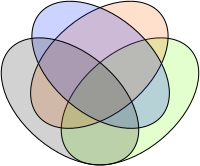
Photo from wikipedia
We propose a method to characterize political ideology using network theory. Our analysis is based on the 2015–2016 Chilean constituent process, where self-convened meetings were held throughout the country to… Click to show full abstract
We propose a method to characterize political ideology using network theory. Our analysis is based on the 2015–2016 Chilean constituent process, where self-convened meetings were held throughout the country to discuss which Values, Rights, Duties, and Institutions should be included in the new constitution. Using this unique dataset, co-occurrence networks were constructed by considering the concepts selected in different meetings. The nodes are the concepts, and a link between two nodes represents the association between them. Political ideology is thus analyzed as an emergent network, and we can identify the main ideological communities in Chile and describe their characteristics. Beyond the local results, the proposed methodology enables representing the diversity of a community’s political orientations in a realistic ecological context.
Journal Title: Applied Network Science
Year Published: 2022
Link to full text (if available)
Share on Social Media: Sign Up to like & get
recommendations!